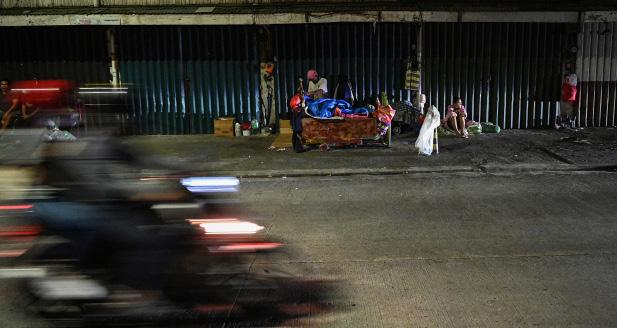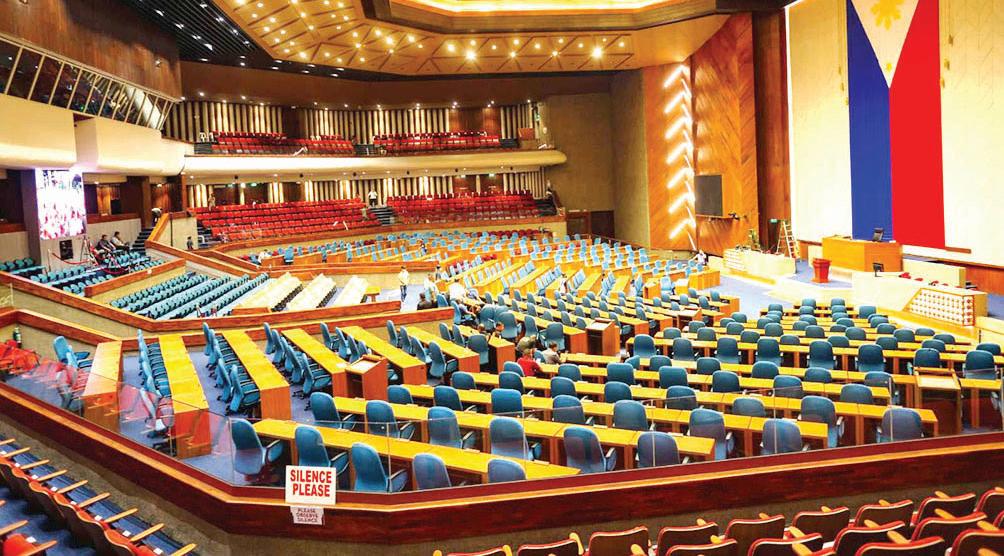
3 minute read
STREET LIFE: MANILA’S HOMELESS FIND SHELTER IN PUSHCARTS
By Mikhail Flores Agence France-Presse
LIKE thousands of homeless people in the Philippine capital Manila, Maricel Abawag and her son used to sleep on flattened cardboard boxes laid out on footpaths. Then they got a pushcart.
Pushcarts, known as karitons, are a common sight in the city of more than 13 million people.
Often made from scraps of wood, the human-powered carts are used as shelter, storage and a source of income, such as collecting trash to sell to recyclers.
Abawag, 44, received her pushcart in November 2020 from a Catholic brother.
About a year earlier Abawag had “lost everything” when her partner was jailed for beating her. He died of a heart
HALLS OF MAJESTY.
The House of Representatives inside the Batasang Pambansa Complex in Quezon City is all primped and ready for the second State of the Nation

Address to be delivered tomorrow by President Ferdinand Marcos
By Maricel V. Cruz
THE resident economist of the House of Representatives is optimistic that the proposed National Land Use Act will soon be enacted into law despite “entrenched interests” that oppose it.
Rep. Joey Sarte Salceda of Albay, one of the main proponents of the bill, said President Marcos “has proven that he can “get the historically difficult done,” in attack in custody. She began sleeping on the streets while still breastfeeding her baby.
“If I were to look for a house we would need to pay rent,” Abawag told AFP.
“Then we would need to pay for electricity, water, rice and milk -- I don’t have enough money.”
Nearly 50 percent of Filipino families consider themselves poor, according to the latest survey by research organisation Social Weather Stations.
Many live in overcrowded slums or on the streets.
‘I’m not afraid’
Ed Billones, who donated the pushcart to Abawag, said people without homes were often viewed as “lazy and addicts”.
In reality, many have come from the provinces in search of work that did not materialise or were forced from their homes by domestic abuse or the loss of the family breadwinner.
Scavenger Boyet Torres, 59, said he fled a violent father decades ago.
He has lost count of the number of pushcarts that have been confiscated by local officials during street-clearing operations.
“If I don’t have one, I’m unable to earn,” said Torres, who collects plastic bottles and cardboard.
“I’ll only earn 30 pesos (54 cents) a day (using sacks) and that’s just enough for food. If I have a kariton, I can earn up to 150 pesos.”
Every night, Abawag and her now four-year-old son sleep inside their pushcart parked under a tree on the footpath of a busy street.
The cart is 1.6 meters (5.2 feet) long and 31 centimeters (about one foot) wide and contains all their worldly goods like a torch, radio, soap, pillows, blankets and toys.
When it rains, Abawag pulls a clear plastic sheet over the top to keep them dry.
Meters away, people eat at restaurants that Abawag will likely never be able to afford.
After losing a precious bag of clothes to a thief, Abawag now locks the pushcart and secures it to the tree before she sets out on foot every day to sell rags.
“If I sell enough rags, I buy food. If I don’t have any sales then I wait for people to give us food,” she said.
Abawag said she was embarrased when she began living on the streets. But her religious faith helped her adjust.
“I’m not afraid to live on the street because I pray to God to not abandon us,” she said.
THE National Development Company (NDC), in partnership with food business incubator Mercato Centrale Group, unveiled the beta launch of the Philippine E-commerce Platform (PEP) at the recent National MSME Summit 2023 held at The Manila Hotel.
PEP is the first government omnichannel that was created to promote Filipino businesses and help them expand online. The platform prioritizes Filipino products and onboards businesses officially registered with the Department of Trade and Industry (DTI) and other government agencies, adding another layer of consumer protection. It also gives buyers access to a wider range of locally-made products by tapping public sector initiatives such as Go Lokal.
The DTI-supported platform is owned by the NDC and connects thru DICT’s e-Gov super-app, the platform for all Philippine government services. Mercato Centrale Group donated the technology to NDC. “We laud the NDC and the Mercato Centrale Group for launching the PEP. Othel V. Campos
HOUSE PANEL SETS MALNUTRITION, CHILD STUNTING SUMMIT
THE committee on poverty alleviation of the House of Representatives will convene a summit on malnutrition and child stunting shortly after Congress starts its second regular session this week..
“We want to address these interconnected problems, along with hunger and poverty, and recommend solutions. We intend to give them top priority,” 1-Pacman Rep. Mikee Romero, the panel’s chairperson, disclosed on Saturday.
He said proper nutrition has a big and long-lasting impact on child growth and health, and even on budget allocation and national development.
“If we have a large number of malnourished children, that would require a bigger budgetary appropriation for healthcare and health facilities, depriving other social services like education and infrastructure of much-needed funding,” he said.
Malnutrition and child stunting also hinder national development and competitiveness, especially in the digital age, he stressed. Maricel Cruz







